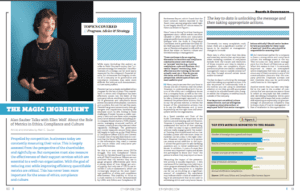Alan Sauber Talks with Ellen Wolf About the Role of Metrics in Ethics, Compliance and Culture. Wolf has served as a member of the Board of Directors of Premier, Inc. since October 2013. More below.
Propelled by competition, businesses today are constantly measuring their value. This is largely assessed from the perspective of the shareholder, and rightfully so. But companies must also measure the effectiveness of their support services which are essential to a well-run organization. With the goal of reducing cost while improving efficiency, quantifiable metrics are critical. This has never been more important for the areas of ethics, compliance and culture.
There continues to be an ongoing discussion in the ethics and compliance community about over-reliance on “process” metrics (e.g., training completions, code certifications, etc.) versus “impact” metrics (e.g., how effective was the training, is the code actually used, etc.). How do you see this issue, and from a Board Chair’s perspective, which types of data are most useful to you?

Many people assume that you have to choose one set of metrics over the other. However, in understanding both the nature of the ethics and compliance issues that a company faces, as well as the company’s response to those issues, one needs to take a three-pronged approach: 1) understand the preventative actions, that is to say, the process metrics; 2) review the impact of the preventative actions, that is to say the effectiveness; and, 3) more importantly, set the right tone and atmosphere within the organization. As a Board member and Chair of the Audit Committee, it is important to see metrics around training and certification.
However, it is equally important that we understand the nature of that training. It is often too easy to sign a certification without really engaging with the material. Training that is performed online, that includes quizzes and minimum times on material, can be a step in the right direction. However, training that is in-person can ensure actual attention to the topic. It allows the participant to ask clarifying questions and to better understand the issues. In addition, it puts a human face to some very important topics and allows the participant to know and “trust” the person to whom they may report an issue. Measuring the impact of the preventative actions is equally important. It lets one know if the training, code, helpline or other program elements are effective. For example, zero complaints to a helpline can be just as troubling as a significant amount of complaints. No complaints may indicate either a lack of understanding or an atmosphere that is not open to addressing ethics and compliance issues.
Measuring the impact of the preventative actions is equally important. It lets one know if the training, code, helpline or other program elements are effective. For example, zero complaints to a helpline can be just as troubling as a significant amount of complaints. No complaints may indicate either a lack of understanding or an atmosphere that is not open to addressing ethics and compliance issues.
Full article available here.
About the Author
Alan C. Sauber serves as Premier Inc.’s Chief Ethics & Compliance Officer with over 30 years of healthcare leadership experience. He oversees the company’s compliance, privacy and security programs along with governance responsibilities to the Audit & Compliance Committee of Premier’s Board of Directors. Prior to Premier, Alan was Senior Vice President of Government Affairs and Chief Compliance Officer at RehabCare Group.
More about Wolf
Ellen C. Wolf has served as a member of the Board of Directors of Premier, Inc. since October 2013. She served as Senior Vice President and Chief Financial Officer of American Water Works Company, Inc., the largest investor-owned US water and wastewater company, from 2006 until 2013. Previously, she served as Senior Vice President and CFO of USEC, Inc. and as Vice President and CFO of American Water Works. Ellen serves as a Director of Airgas, Inc., and also serves on the Board of Directors of the Philadelphia Zoo.




